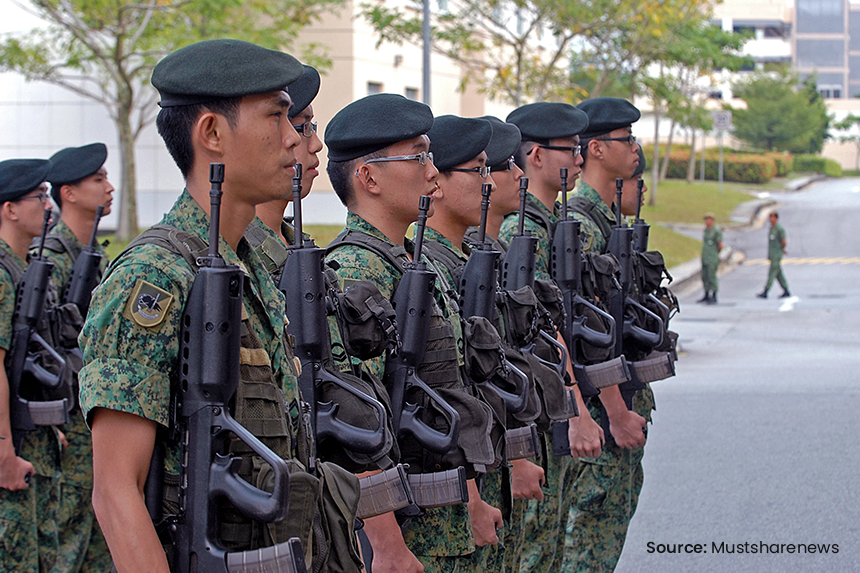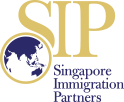With its excellent infrastructure, abundant economic opportunities, and high standard of living, it is unsurprising that Singapore often ranks among the most popular destinations for expatriates seeking to migrate to a new country, not to mention the numerous benefits that come with settling down in this thriving nation as a Singapore PR.
Nevertheless, those who wish to apply for PR in Singapore should be aware that a successful PR application can affect various aspects of your life and finances. Let us explore these impacts in more detail so that you can gain a better insight into whether becoming a Singapore PR is the right step for you.
Learn More: Your Complete Guide To Becoming A Singapore PR
Consideration #1: Male PRs must enrol for National Service

Source: Mustsharenews
Like Singapore Citizens, male PR holders must serve the military or civil defence forces upon reaching 18 years old. Those granted PR status under the Professionals, Technical Personnel, and Skilled Workers Scheme or the Global Investor Programme are exempted from this obligation.
However, male applicants who apply for Singapore PR via the Foreign Student Scheme or under their parents’ sponsorship are eligible for National Service (NS) and must register for NS upon reaching 16½ years old. Subsequently, they will be scheduled for enlistment at the earliest opportunity when they turn 18 years old.
Meanwhile, male PR holders and those who were previously Singapore citizens or Singapore permanent residents are still liable to be called up for NS regardless of the scheme under which their PR status was granted. This mandate can affect individuals with personal or professional commitments during their service.
Those who choose to renounce their PR status without serving or completing full-time NS can face severe repercussions if they plan on staying in Singapore long-term. Not only will their applications for work or study be viewed less favourably. Their family members’ applications for long-term visas, renewal of Re-Entry Permits, or Singapore Citizenship will also be adversely affected.
Consideration #2: HDB purchase restrictions
Many expatriates mistakenly assume they are eligible to purchase an HDB flat once their application for PR in Singapore is approved. However, that is not always the case. To clarify, Singapore PRs can only purchase a BTO or SBF flat directly from the Housing and Development Board (HDB) if they tie the knot with a Singapore Citizen.
Conversely, couples who are both PR holders can only purchase a resale flat. Even then, you must fulfil specific requirements. Firstly, both spouses must be Singapore PRs for at least three years. Secondly, you must meet the Ethnic Integration Policy (EIP) and the Singapore Permanent Resident (SPR) quotas before you can buy the resale flat.
Additionally, PRs with properties overseas are disqualified from purchasing an HDB flat. This limitation forces you to choose between selling your property outside of Singapore or forgoing the opportunity to own an affordable house in the country, posing a dilemma for those with investments or family ties abroad.
Consideration #3: Your take-home pay is reduced

You may notice a reduction in your take-home salary after successfully applying for and becoming a Singapore PR. That is because Singapore PRs are eligible for Central Provident Fund (CPF) contributions. The contribution rate starts at 20% of your salary before decreasing to 15% and 9.5% when you reach 55 and 60 years old, respectively.
You are also expected to contribute to one of the various Self-Help Groups (SHGs) in Singapore. The ethnicity stated in your identity card will determine which fund your contribution ends up in. Your employer will deduct a specific amount from your salary and pay it to the CPF Board, as it is the collecting agent for the SHG funds.
Consideration #4: CPF limitations
On the subject of CPF, you should note that while these contributions are meant to ensure financial security in the long run and help fund vital aspects of your life, such as housing and healthcare, some individuals feel the returns provided by the CPF Board do not meet their expectations. As such, they view this mandate as a drawback, as they believe the fund can be better invested elsewhere.
Furthermore, your CPF funds are inaccessible until you turn 55 years old or leave the country permanently. This lack of accessibility could be detrimental to Singapore PRs with urgent financial needs or those who prefer to invest their money in other assets.
Of course, many Singapore PRs are also thankful for their CPF contributions, as they help offset specific living costs while functioning as a retirement scheme. Ultimately, how you view this mandatory contribution will depend on your financial goals and expectations after your successful PR application.
As you embark on the path to becoming a Singapore PR, it is imperative that you consider all aspects that come with this status. A thorough understanding of these considerations will ensure you make an informed decision. If you believe applying for Singapore PR is still the right choice, we recommend checking the Singapore PR requirements beforehand.
If you are eligible for Singapore PR and require help with your PR application, look no further than Singapore Immigration Partners. Our experienced consultants have assisted numerous applicants with their successful PR applications. As such, we are familiar with the intricacies of the process and can aid you in navigating your PR journey seamlessly. Contact us today to schedule an appointment with our PR consultants.

